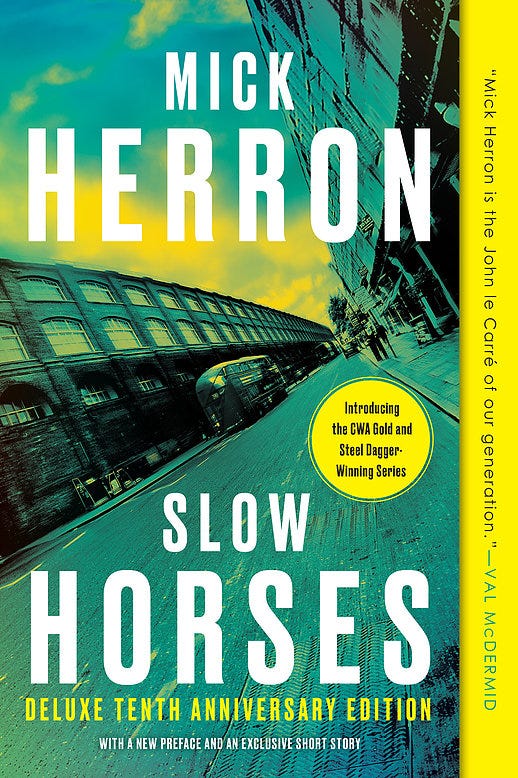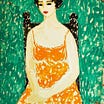Spying Failure: On Mick Herron’s Slough House Series
Herron's books, the television adaptation of which will release in April on Apple TV, grant us the pleasures of spy fiction even as they refuse the genre's underlying assumptions.
Spy fiction values competence, success, and glamour.
Even Eric Ambler’s tales of ordinary men bumbling into extraordinary circumstances and John Le Carré’s somber depictions of betrayal, assume the hero knows what he’s doing.
But what about the bad spies? The mediocre, the ordinary, the failures? What if all the agents who screwed up were banished to a decrepit building and given mind-numbing make-work projects?
This is the winning conceit of British thriller writer Mick Herron’s Slough House series, now up to seven books. Despite great success in the UK they remain a connoisseur’s delight here in the US. Read them before the forthcoming adaptation, starring Gary Oldman and Kirsten Scott Thomas, drops next month on Apple TV, when, if there’s any justice, they’ll be a hit.
The Slow Horses, as those banished agents are disparagingly known at the Park (the headquarters of the British Secret Services) can’t be fired. They know too much, and their failures redound too embarrassingly on the agency. Better to bore them into quitting. To speed that along, the Park has given them a boss so disagreeable—flatulent, mean-spirited, idle, though possibly also brilliant—that they soon hate every minute of every day. Herron has said that although he doesn’t know much about being a spy, he knows plenty about working in an office. The books have their share of action and drama, no doubt. But their real subject is what it means to have a job under the conditions of contemporary capitalism, where almost every task that touts itself as having value beyond the exchange of labor for money—every job that used to be a career, including being a spy—has been reduced to precarity. Why do we care about jobs when they don’t care about us? Can we form attachments to our coworkers, when they’re as exploited as we are?
The series lends itself to such meditations because Herron has such a gift for characterization. His spies aren’t particularly kind or compassionate or capable, yet we are drawn to them—and not because they’re glamorous evildoers. The Slow Horses have not sold out their country to the enemy. They were more likely to have left a flash drive with sensitive information on a train, messed up a simple tail job and unwittingly let a cache of guns on to the streets, or bungled an exercise that, in real life, would have let terrorists murder hundreds of civilians. The exception is their boss, Jackson Lamb, who is extraordinarily repellant—but also captivating. (Will the tv show have the courage to make him as coarse as he is in the books?) Picture Reginald Hill’s Detective Superintendent Andy Dalziel, all bluster and voracious appetite, but moreunkind, more cutting, more hurtful: that’s Lamb. (Lamb, who drinks and smokes in the office at all hours of the day, regularly offers drinks to the most conscientious of the Slow Horses, Catherine Standish, a recovering alcoholic.) Like Dalziel, though, Lamb is excellent at solving cases and averting crises. Plus he really cares about his team—or maybe just about his fiefdom. Herron nimbly moves between presenting Lamb as horrible and redeeming him as secretly kind. (His idea of a pep talk is to give an agent who, having fallen afoul of the wrong people, has “paedo” carved into his face, a razorblade so that the man, unable to live with a false accusation written on his body, can kill himself. Hard to tell if this is kind or cruel.) Similarly, the Slow Horses aren’t all secretly misunderstood geniuses. They get by, and sometimes save the day, but they also mess up a lot.
Life might be lousy for most of the characters, but the novels that tell their stories are great fun, full of unexpected reversals and even the occasional triumph. They’re also funny, albeit sometimes abrasively. Lamb is usually described as being able to move silently, but sometimes he prefers to make his presence known, as when he “attacks the stairs with the noise that a bear pushing a wheelbarrow might make, if the wheelbarrow was full of tin cans, and the bear drunk.” Slough itself—the town not the headquarters—is said to have “managed to crawl this near to London and then given up. No ambition.” But more important than the one-liners is the absurdism that incites uneasy, helpless laughter. That guy Lamb gave the razor too? He didn’t kill himself. He sliced his face so badly that the scars, a crosshatch of pain, would obliterate the hateful word. Funny, right? Right?
The first book in the series, Slow Horses (2010)—Herron’s patented mashup of Le Carré, the 1980s action series The A-Team (where the plan always came together), and a barroom bull session—remains the best, but the occasional dip in later volumes notwithstanding the series maintains its quality largely because Herron creates satisfyingly long story arcs and regularly introduces new characters. Be warned, though: these are not the books for you if you hate having favorite characters killed off. In fact, the thing I like least about the series is that Herron plays with this tactic too archly, regularly leaving you guessing for pages whether one of the Horses will live to struggle through another day—a day bound to be so dull that when the chance to do some real (exciting, dangerous) spy work comes along, they’re likely to make a cock-up of it from sheer nerves.
If you like non-stop action in your spy fiction, try Lionel Davidson. If you delight in detailed descriptions of spycraft practiced in foreign locales, read Charles Cummings. In Herron’s world, The Slow Horses seldom leave London. They barely even leave Slough House. His fascination with its nondescript decrepitude—each book begins and ends with a set-piece in which readers are encouraged to imagine themselves as ghosts (spies of a different sort) trailing through its floors—is delightfully strange. Imagine the “Time Passes” section of To the Lighthouse rewritten for the Len Deighton set. But the drab office space is gloriously, perversely appropriate for a world in which most people are excellent only at screwing up. In Joe Country (2019), a character muses, “Slough House was a constant reminder that neglect was one of the few things you didn’t have to work at to achieve an impeccably high standard.”
I predict people will be reading these spy novels for years, marveling at the way they grant us the pleasures of the genre even as they refuse its underlying assumptions. If you like clever page-turners that leave you cheering for a bunch of ragtag misfits one minute, and deploring their misfortune and poor judgment the next, shoulder your way through the back door that always sticks and enter Slough House. And don’t even ask about the front door. No one’s ever opened it. A sophisticated decoy, you ask? Nope. Just shoddy workmanship. Only a craftsman like Mick Herron could make failure so appealing.
Nota Bene: All books linked here at Close Reads HQ take you to our Bookshop.org page. We appreciate your support and hope you will patronize your local bookshops.
This essay was originally published in the old Goldberry Review newsletter.







